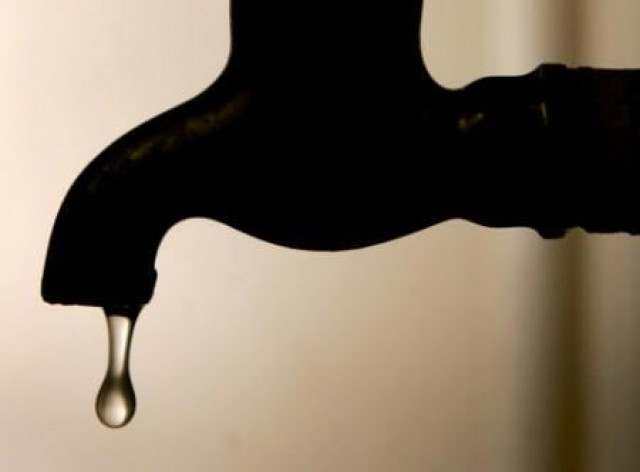40% of Karachi without water for last 15 days
Inequitable distribution, water theft by KWSB officials aggravates crisis

Water. PHOTO: REUTERS
Citizens have appealed to Local Government Minister Saeed Ghani to take notice of the crisis while many who are fed up have resorted to protests against the water shortage in various neighbourhoods.
According to sources in the KWSB, officers of the bulk supply department are to blame for the unfair water distribution in various parts of the city, including Gulshan-e-Iqbal, Korangi, Gulistan-e-Jauhar, Buffer Zone, Orangi Town, Malir, Shah Faisal Colony, Surjani Town, North Karachi, Baldia Town and Keamari.
The KWSB sources claimed that the bulk supply lines of the water board have been diverted to supply water to illegal hydrants established in different areas, such as Gulshan-e-Iqbal, Mauripur, Hub River Road and Ittehad Town.
The tanker mafia is profiteering from the massive KWSB theft and selling the water at exorbitant rates. The sources shared that around four to five million gallons of water is being stolen on a daily basis.
Frustrated and helpless: Karachiites take to the streets over power, water shortage
"The unfair water distribution of the water board has devastated the city's water supply system. The citizens are being deprived of a basic facility," one KWSB official said, adding that areas which previously had regular supply of water have also been affected by the current crisis, compelling the residents to pay large sums of money for tanker water. The citizens have appealed to Ghani to take notice of the issue and take action against the officers involved in water theft.
Struggle continues
Meanwhile, presidential candidate Arif Alvi of the Pakistan Tehreek-e-Insaf (PTI) has said that a neat and clean Karachi is the party's first priority.
He expressed this view while addressing a think tank dialogue, 'Is struggle for water an alternative approach towards resolution of water crisis', organised by the Hisaar Foundation on Monday.
He said that the PTI government will resolve the water, garbage and sewerage crisis in Karachi. The dialogue aimed to analyse the current progress in resolving the water crisis, different aspects of policy making and advocacy in relation to water.
Water shortage prompts Karachi's residents to take to the streets
The panel comprised experts, including Advocate Shahab Osto, former KWSB chief and a member of the Sindh Water Commission Task Force Suleman Chandio, chief of the World Bank fund formed for betterment in the water sector, Dr Fateh Marri, former MPA Samar Ali and Hisaar Foundation Chairperson Seemi Kamal.
A geography professor at Kings College, London, Dr Danish Mustafa, was the panel moderator.
Kamal said that the scarcity of potable water within the drinking water available is alarming. She said around 44% of the country's population is deprived of potable water.
Pakistan is among the 10 countries where clean drinking water isn't available, she shared, adding that bacteria present in the water in Pakistan is dangerous for human development.
Raising awareness about the negative impacts of bacteria in water, she said that not only do lung and kidney diseases emerge from consumption of polluted water, but people are also contracting cancer, blood disorders and birth defects are taking place. According to a report by the Pakistan Council of Research, 69% to 85% of the water samples are dangerous to health.
People take to streets over continuous water shortage
Every fifth person is affected by diarrhea - one of the most common illnesses in Pakistan - due to consumption of polluted water, according to the report.
The report states 60% children in Pakistan get affected by diarrhea, which is the highest estimate in Asia.
Pakistan is also among the 10 countries worst-affected by the climate change.



















COMMENTS
Comments are moderated and generally will be posted if they are on-topic and not abusive.
For more information, please see our Comments FAQ